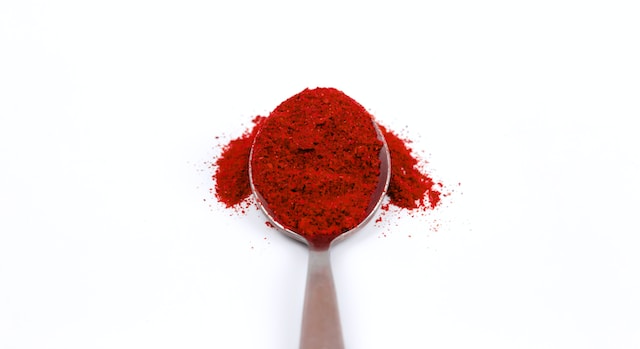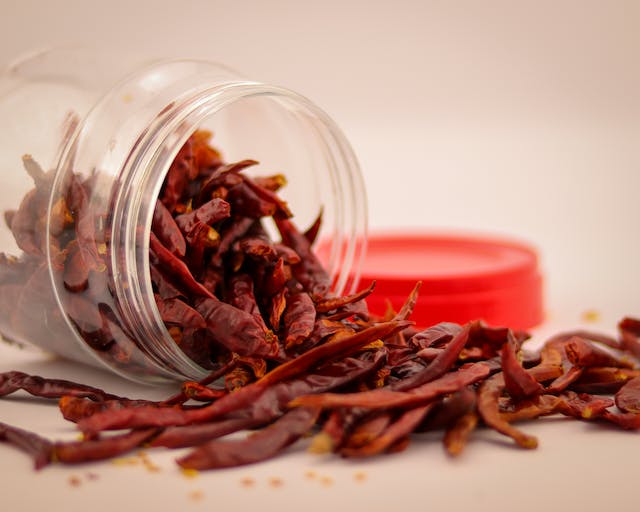Cayenne pepper is a type of chili pepper, often known for its spicy flavor used to add heat and kick to various foods. This specific type of pepper from a cayenne pepper plant has similarities to other nightshades, such as eggplants and tomatoes. Many recipes use cayenne pepper in its powdered form as a spice, however, the pepper in whole form is naturally long and skinny, usually between 10 to 25 cm in length.
While you may have thought of cayenne pepper as only an element to add spice to your meals, it turns out this powerful pepper offers lots of health benefits, too. But why is cayenne pepper good for you? Let’s dive in to find out.

Cayenne pepper benefits
Cayenne pepper can add more than just a kick to your food, offering quite a few surprising health benefits. Check out some of the most exciting benefits of cayenne pepper below.
Improved blood flow
The phytochemical capsaicin found in cayenne pepper can help improve blood flow and help lower blood pressure. Capsaicin has the powerful ability to stimulate the release of vasodilators, which work to expand your blood vessels. When blood vessels can work more efficiently and expand naturally, blood pressure naturally comes down. If you’re wondering how to increase blood flow, just add a bit of cayenne pepper to your favorite foods!
High in antioxidants
Cayenne pepper is high in antioxidants, including high levels of vitamin A and vitamin C. Some of these antioxidants may be lost slightly when cayenne pepper is processed into cayenne pepper powder, but it still contains high amounts of these antioxidants even in powder form. Just 1 teaspoon of cayenne pepper powder can provide about 15% of a person’s daily requirement of vitamin A.
These antioxidants play many important roles throughout the body, including supporting good eye health and fighting against certain diseases. Vitamin A also plays a critical role in reproductive health and supporting a healthy immune system.
In a study that examined the benefits of many different types of peppers, cayenne pepper held the most ability to potentially help reduce the risk of developing certain types of cancer and heart disease. Not only is cayenne pepper high in vitamin A and vitamin C, but it also contains great levels of vitamin B6 and vitamin K.
Use cayenne pepper instead of salt
Certain medical conditions may require people to eat a diet that is low in salt, which can be challenging. Consuming too much salt is associated with high blood pressure and other chronic diseases. Using cayenne pepper to add flavor and vibrancy to food instead of salt is a great alternative! If you find yourself reaching for the salt, try adding a dash of cayenne pepper powder instead.
Inflammation and digestive health
The high levels of capsaicin found in cayenne pepper also have anti-inflammatory benefits. This compound can help reduce the inflammation that is often associated with heart disease. The anti-inflammatory effects of capsaicin can also be useful in helping to reduce joint pain in chronic conditions, such as arthritis.
Even more interesting is capsaicin’s ability to increase the production of stomach acid, which can support a healthy digestive system. Capsaicin works by supporting the movement of stomach muscles, helping to break down food quicker and enhance nutrient absorption.
Boosting the metabolism
Some proponents of intermittent fasting for weight loss also suggest that using cayenne pepper on your fast can help accelerate fat burning and boost the metabolism. Since capsaicin increases blood flow and stimulates the production of heat in the body, this can also lead to enhanced metabolic activity. Cayenne pepper can be safely consumed during a fast in small quantities, such as mixed into a cup of hot tea or coffee.

Adding cayenne pepper to your diet
Taking advantage of these amazing benefits of cayenne pepper is easy when you find creative ways to add cayenne pepper to your foods. One of the best ways to use cayenne pepper is to mix it into any type of hummus or dip, adding a slight kick to level up your dip. Hummus is a great healthy snack that works well when paired with celery or sliced bell peppers. Many people also enjoy adding cayenne pepper into seasoning blends used for sauteed vegetables.
Another way to add cayenne pepper into your meals is to sprinkle a pinch into your morning eggs. Cayenne pepper tastes awesome in scrambled eggs, omelets, or nearly any way you enjoy your eggs. This method is great for people who don’t love super spicy foods, as the pinch is just enough to add some benefits without overpowering your meal.
If you really love spicy things, try adding a sprinkle of cayenne pepper to a warm cup of tea. Consuming the pepper itself can help you get the most benefit from cayenne — but be prepared for the kick. Spicy food lovers often enjoy chopping cayenne up and using it in homemade salsa recipes or even in meat marinades. Once you find easy and simple ways to use cayenne pepper in your diet, you won’t want to go back.




